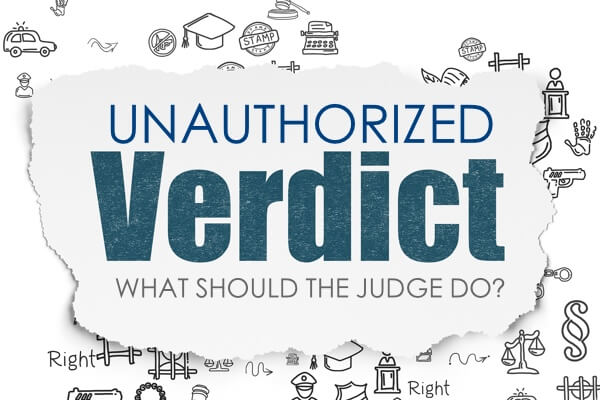
What Should the Trial Judge Do When the Jury Returns an Unauthorized Verdict?
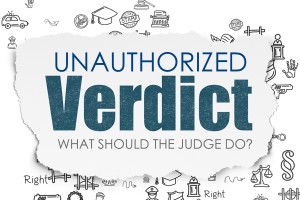 At the trial of Reginald Nixon for burglary of a habitation and evading arrest, the jury returned a guilty verdict and sentence of 7 years for the burglary and 9 years for the evading. However, the verdict form contained a handwritten note that read: “*To be served consecutively, not concurrently.” A consecutive sentence would mean that the two verdicts are added together to make the actual prison term 16 years. The jury had previously asked the judge whether the sentences would run concurrently and the judge refused to answer them, advising them to simply continue with their deliberations. Without an answer to their question, the jury took the matter into their own hands.
At the trial of Reginald Nixon for burglary of a habitation and evading arrest, the jury returned a guilty verdict and sentence of 7 years for the burglary and 9 years for the evading. However, the verdict form contained a handwritten note that read: “*To be served consecutively, not concurrently.” A consecutive sentence would mean that the two verdicts are added together to make the actual prison term 16 years. The jury had previously asked the judge whether the sentences would run concurrently and the judge refused to answer them, advising them to simply continue with their deliberations. Without an answer to their question, the jury took the matter into their own hands.
The problem with the jury’s verdict of 7 years and 9 years to run consecutively is that it is not an authorized sentence. Under Texas law, the sentences in Nixon’s case were required to run concurrently rather than consecutively. As a result, the trial judge refused to accept the sentences and reform them to run concurrently (as he was urged to do by Nixon’s counsel). Instead, the judge sent the jury back with a note advising them that the sentences cannot run consecutively. The jury soon returned with new verdicts of 16 years confinement for each offense, which the judge accepted.
Nixon appealed, again urging that the trial judge erred by failing to accept and reform the original jury verdicts. The 2nd Court of Appeals (Fort Worth) affirmed the trial court’s judgments and “reasoned that while the judge may have had the authority to reform the verdict under Article 37.10, he also had the authority to refuse the verdict and return the jury to their deliberations pursuant to this Court’s opinion in Muniz v. State [573, S.W.2d 792 (Tex. Crim. App. 1978)].”
The Texas Court of Criminal Appeals granted review and now reverses the holding of the 2nd Court of Appeals. The CCA highlighted the changes that were made in 1985 when the legislature enacted Section 37.10(b) of the Texas Code of Criminal Procedure. This change distinguished between “informal” and “unauthorized” verdicts. For unauthorized verdicts, Section 37.10(b) provides:
If the jury assesses punishment in a case and in the verdict assesses both punishment that is authorized by law for the offense and punishment that is not authorized by law for the offense, the court shall reform the verdict to show the punishment authorized by law and to omit the punishment not authorized by law.
CCA explained that the lower court’s reliance on Muniz was misplaced since Section 37.10(b) was not enacted at the time Muniz was decided. Further, the verdict form in Muniz was incomplete, unlike the verdict in this case, which was complete but contained an unauthorized portion.
The CCA concluded by holding:
Although the terms of confinement were 45 authorized punishments, the attempted cumulation was punishment unauthorized by law. Article 37.10(b)’s plain language is clear that, when the jury assesses punishment and returns a verdict assessing punishment that is both authorized and unauthorized by law, “the court shall reform the verdict to show the punishment authorized by law and to omit the punishment not authorized by law.” Accordingly, we hold that the judge erred in failing to accept the initial punishment verdicts and omit the jury’s unauthorized attempt to stack the terms of confinement.
Judge Alcala and Judge Yeary dissented.


 In the age of social media it seems more and more that our identities are being fast tied to what we post, like, love, or retweet on social media. Our firm handles criminal cases on a daily basis and in the course of our work we’ve seen an increasing reliance by law enforcement and prosecutors on social media websites like Facebook, Twitter, and Instagram. More often than not, investigators are scrolling through the entirety of a person’s social media profiles scouring the information for incriminating statements, pictures or conversations. A Facebook picture or an Instagram post that one might consider innocent, humorous, or obscure could end up being a key piece of evidence used against that person in a court of law.
In the age of social media it seems more and more that our identities are being fast tied to what we post, like, love, or retweet on social media. Our firm handles criminal cases on a daily basis and in the course of our work we’ve seen an increasing reliance by law enforcement and prosecutors on social media websites like Facebook, Twitter, and Instagram. More often than not, investigators are scrolling through the entirety of a person’s social media profiles scouring the information for incriminating statements, pictures or conversations. A Facebook picture or an Instagram post that one might consider innocent, humorous, or obscure could end up being a key piece of evidence used against that person in a court of law.
 In Texas, our “failure to protect” statute is an omission statute—Injury to a Child by Omission—meaning it aims to encourage parents to remove their children from dangerous and violent environments. If a parent “fails to protect” their child from certain known dangers, that parent can be charged with Injury to a Child by Omission, a felony level offense in Texas. The statute also covers injury to an elderly or disabled individual. If the person charged with Injury to a Child by Omission is a domestic violence victim, it is important to be aware of the Affirmative Defense Texas provides.
In Texas, our “failure to protect” statute is an omission statute—Injury to a Child by Omission—meaning it aims to encourage parents to remove their children from dangerous and violent environments. If a parent “fails to protect” their child from certain known dangers, that parent can be charged with Injury to a Child by Omission, a felony level offense in Texas. The statute also covers injury to an elderly or disabled individual. If the person charged with Injury to a Child by Omission is a domestic violence victim, it is important to be aware of the Affirmative Defense Texas provides.
 We’ve all seen those yellow “Baby on Board” signs proudly displayed by new parents on the back windows of cars. In a perfect world, drivers would slow down and car accidents involving children would never be an issue. But we don’t live in a perfect world. The Insurance Institute for Highway Safety (“IIHS”) reports that car accidents cause
We’ve all seen those yellow “Baby on Board” signs proudly displayed by new parents on the back windows of cars. In a perfect world, drivers would slow down and car accidents involving children would never be an issue. But we don’t live in a perfect world. The Insurance Institute for Highway Safety (“IIHS”) reports that car accidents cause 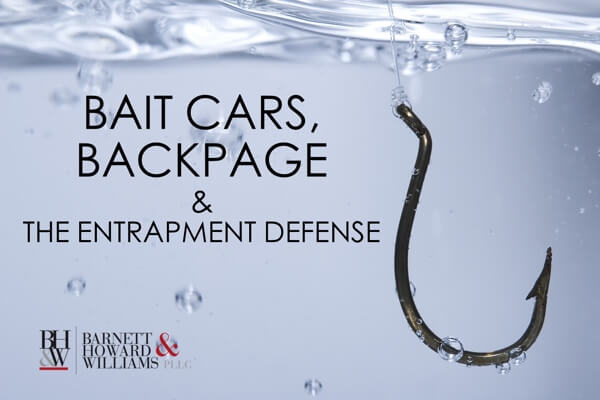
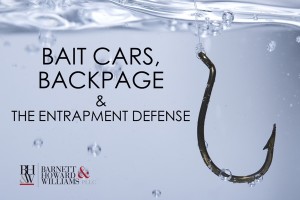 Our firm has represented many defendants in Fort Worth with cases stemming from a bait car or a Backpage ad. For those of you not familiar with either, let me explain Bait Cars and Backpage.
Our firm has represented many defendants in Fort Worth with cases stemming from a bait car or a Backpage ad. For those of you not familiar with either, let me explain Bait Cars and Backpage.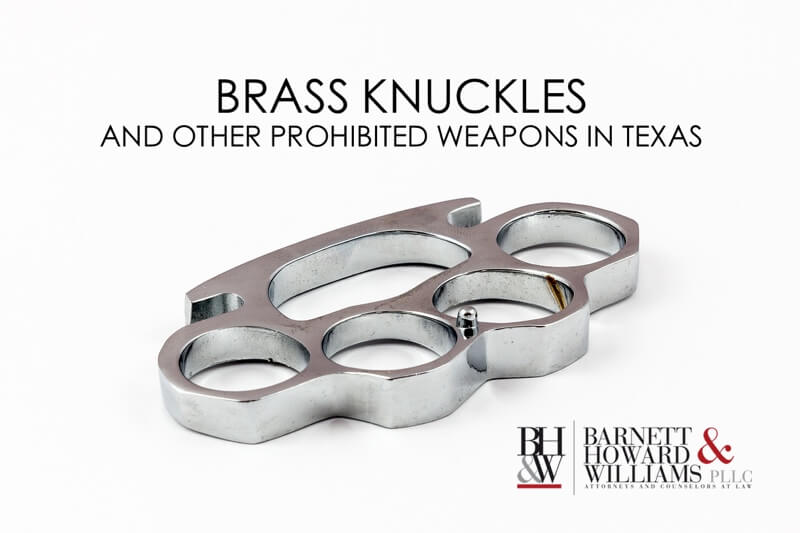
 Yes, brass knuckles are illegal to possess in Texas. Under
Yes, brass knuckles are illegal to possess in Texas. Under 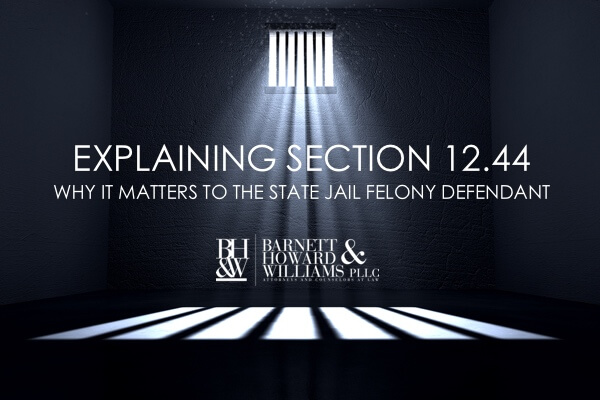
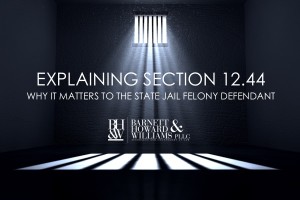 Our Fort Worth criminal defense attorneys are routinely asked by family and friends of clients charged with State Jail Felony offenses about 12.44(a) and 12.44(b). Although it is sometimes elusive, our attorneys have had success in reducing State Jail Felony cases under Section 12.44. This article will discuss Sections 12.44(a) and 12.44(b) of the Texas Penal Code and explain why they are important to the State Jail Felony defendant.
Our Fort Worth criminal defense attorneys are routinely asked by family and friends of clients charged with State Jail Felony offenses about 12.44(a) and 12.44(b). Although it is sometimes elusive, our attorneys have had success in reducing State Jail Felony cases under Section 12.44. This article will discuss Sections 12.44(a) and 12.44(b) of the Texas Penal Code and explain why they are important to the State Jail Felony defendant.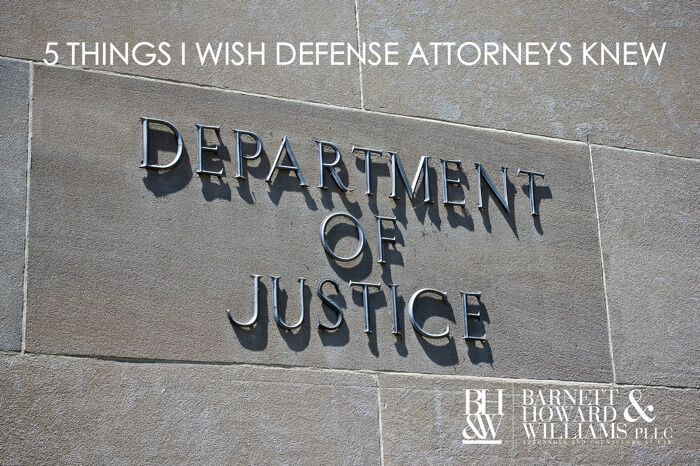
 Glen. R. Hines (
Glen. R. Hines (
 Public Service Announcement: Attorneys beware that your clients could be the target of a Bail Bond scam that is going around. There is a person with a Florida phone number (352-210-7464) that is calling criminal defendants in the DFW area claiming to be a representative from their bail bond office. The caller then claims that the person (who is typically in good standing) owes some amount of money to the bail bondsman. The caller then threatens to go off the bond if the person does not pay immediately.
Public Service Announcement: Attorneys beware that your clients could be the target of a Bail Bond scam that is going around. There is a person with a Florida phone number (352-210-7464) that is calling criminal defendants in the DFW area claiming to be a representative from their bail bond office. The caller then claims that the person (who is typically in good standing) owes some amount of money to the bail bondsman. The caller then threatens to go off the bond if the person does not pay immediately.
 Texans love their guns and many folks in Texas are excited about the new “Open Carry” laws that were passed this year. Some people imagine a wild west where handguns are worn on the hips of everyone in town. Other are terrified that gun-related incidents will increase. Well, the new open carry laws do not come without their rules.
Texans love their guns and many folks in Texas are excited about the new “Open Carry” laws that were passed this year. Some people imagine a wild west where handguns are worn on the hips of everyone in town. Other are terrified that gun-related incidents will increase. Well, the new open carry laws do not come without their rules.





